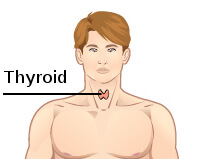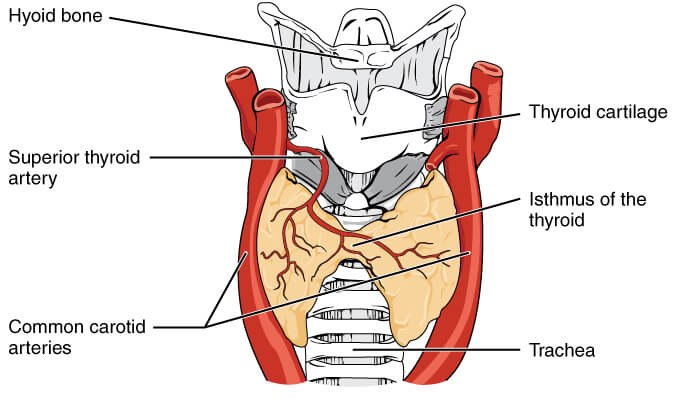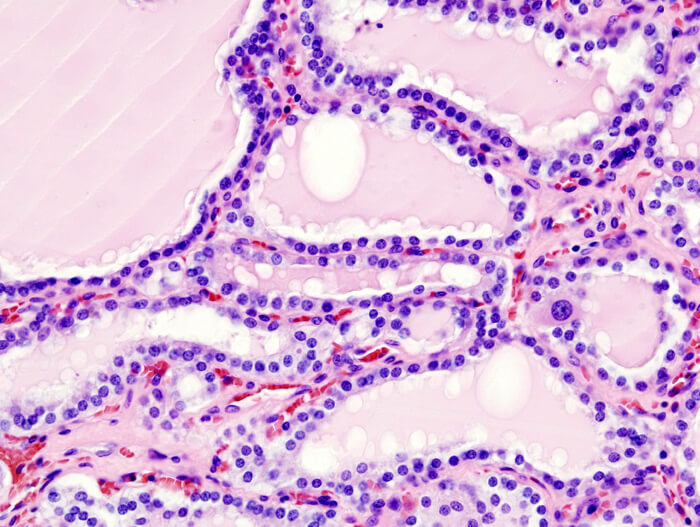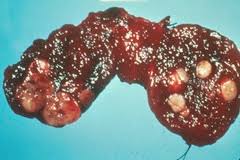There are lots of diseases caused by the disbalance of the thyroid hormones. Here you match your symptoms to find what are your problems and find the treatment here only.
Here we will learn about the symptoms of thyroids, how to cure the thyroids? And What are the types and main causes of thyroids?
We already knew that thyroid problems are more common in women. However, we can also these problems in men, teenagers, newborn babies.
POST CONTENTS
Thyroid and Its Location
The thyroid is a butterfly-shaped Gland found at the base of your neck just below your Adam’s Apple.
It is the endocrine gland. It produces hormones that travel in your blood in all parts of your body.
Thyroid hormones control your body’s metabolism in many ways including how fast you burn calories and how fast your heart beats.
Location of the thyroid gland: The thyroid lies below your Adam’s apple, along the front of the windpipe.
The gland secretes three hormones namely the two hormones( thyroxine/ T4 and triiodothyronine/ T3) and calcitonin.
These hormones primarily influence the metabolic rate of protein synthesis calcitonin plays a role in calcium homeostasis.
Anterior pituitary gland secrets Thyroid-stimulating hormone (TSH) which regulates the hormonal output from the gland.

How Do Thyroid Hormones Work in Our Body?
There are lots of functions and works of thyroid hormones because thyroid hormones are one of the most important parts of our body.
Therefore, we will learn about the functions, what they can cause when they get less or more secreted, even it affects our whole body.
1. Thyroid hormones:
It produces the iodine-containing thyroid hormones, Triiodothyronine (T3) and Thyroxin (T4), and the peptide hormone Calcitonin.
Metabolic:
- Increase the basal metabolic rate.
- Appetite.
- Absorption of substances.
- Gut motility.
- Generation, uptake of cells.
- Breakdown of glucose.
- Decrease cholesterol level.
Cardiovascular:
- increase the rate and strength of the heartbeat, the rate of breathing, the intake, and consumption of oxygen activity of mitochondria, the blood flow.
- Regulate the body’s temperature.
Developmental:
- increase the growth rate of young people.
- increase the growth rate of cells in developing the brain.
- In brain maturation.
However helps in maintaining normal sexual function, sleep and thought patterns. Maintenance of the normal menstrual cycle.

2. Regulation:
Stimulate thermogenesis (the process of heat production in organisms).
3. Calcitonin:
It helps in regulating blood calcium levels. Release of Calcium from bone osteoclasts, cells that break down bone.
To get to know about what are the symptoms, we have to first learn about the types of it, whether it is hypothyroidism, hyperthyroidism and how they affect our body.
What Are The Types Of Thyroid?
1. Hyperthyroidism:
Definition: When the thyroid gland produces an excessive amount of thyroid hormones (T4/T3) is called hyperthyroidism. T3 is the most active thyroid hormone

Symptoms of Hyperthyroidism
Here are some common symptoms of hyperthyroidism.
- Weight loss
- fatigue weakness
- decrease concentration
- irregular and scent periods
- fine or brittle hairs
- Rapid Heartbeat
- excessive sweating
- heat intolerance
- nervousness and anxiety palpation
Diseases Caused by Hyperthyroidism
- Graves disease
- Toxic Multinodular goiter
- solitary thyroid adenoma ( benign tumor)
- Inflammation
- Insomnia
- hair loss
Treatment of Hyperthyroidism
- There are lots of medicines like antithyroid drugs radioactive iodine is available
- Surgery of the gland.
- Two main antithyroid drugs available for use in the United States to treat hyperthyroidism, methimazole (Tapazole) and propylthiouracil (PTU).
- The major risk of these medications is occasional suppression of the production of white blood cells by the bone marrow (agranulocytosis).
These medicines have some benefits and also, some side effects so, consult the doctor before using these medicines.
2. Hypothyroidism:
Definition: When an underactive thyroid gland supplies the release of thyroid hormones results in hypothyroidism.

Symptoms of Hypothyroidism
Here are some common symptoms of hypothyroidism.
- Abnormal weight gain
- Tiredness
- Constipation
- heavy menstrual bleeding
- hair loss
- cold intolerance
- slow heart rate
Diseases Caused by Hypothyroidism
Iodine deficiency is the most common cause of hypothyroidism worldwide
- Hashimoto’s thyroiditis (an autoimmune disease in which the gland is gradually destroyed) is the most common cause in the developed world.
- Congenital abnormalities.
- can result in myxoedema or myxedema coma( altered mental state)
Treatments for Hypothyroidism
- Involves daily use of the synthetic thyroid hormone levothyroxine (Levo-T, Synthroid, others).
- This oral medication restores adequate hormone levels, reversing the signs and symptoms of hypothyroidism
3. Thyroid Nodules :
Here are some common symptoms of nodules.
What Are Thyroid Nodules?
Thyroid nodules are the nodules that commonly arise within an otherwise normal gland.
Moreover, they may be hyperplastic or humorous, but only a small percentage of tumors are malignant

Symptoms of Thyroid Nodules
- Usually, it does not cause any symptoms and non-cancerous.
- Non-cancerous cases include simple cyst colloid nodules and adenomas
4. Goiter
An enlarged thyroid gland is called goiter. Goiter is present in some form in about 5% of people.

Symptoms of Goiter
Here are some common symptoms of goiter.
- Swelling at the base of the neck
- Tight feeling in throat
- Hoarseness
- Coughing
- Difficulty in breathing
- Difficulty in swallowing
- Neck vein swelling
Treatments Of Goiter
- Your doctor may tell you to take an aspirin or May prescribe corticosteroid if you have inflammation of the thyroid gland
- Levothroid or Synthroid (levothyroxine) in hypothyroidism (underactive)
- One another treatment is surgery
- Radioactive Iodine
- Consult your doctor and learn which treatment suits you
What Are The Symptoms Of Thyroid?
To check the symptoms we have to look under the hyperthyroidism, hypothyroidism, nodules, and goiter. Check the other symptoms below,
Symptoms of Thyroid in Man:
- Feeling cold
- Tiring easily
- Dry skin and brittle nails
- Constipation
- Depression
- Trouble concentrating
- Sore muscles
- Weight gain
Symptoms of Thyroid in Women:
- Problem with the menstrual period
- Problems in getting pregnant
- Feeling irritable
- Muscles weakness
- Increased sweating
- Eating more
- Weight loss even after you eat the same or more food
- Fewer and lighter menstrual period
How To Examine Your Thyroid?
You can examine your thyroid gland. There are lots of ways to examine your thyroid gland. Check this out below,
According to endocrineweb.com if you want to examine
- Face a mirror
- Take a sip of water
- Tilt your head back, while still being able to see the mirror
- When you swallow the water, look for any lumps or areas that are not the same on both sides of the gland
- Thyroid nodules are usually round in shape and move with the gland when you swallow.
You may feel the nodule rolling underneath your fingertips or see it move when you swallow. A goiter (swelling) can be found on one side of the thyroid or on both sides.
If you find any lumps or swelling in this area, talk to your doctor. Lumps or nodules on the gland do not necessarily mean that you have a hormonal disorder or cancer.
These nodules are very common and often do not cause any other issues.
Causes Of Thyroid Problems
- Iodine deficiency
- Inflammation of gland caused by a virus or bacteria
- Nodules on non-cancerous lump inside the gland
- Can cancerous tumor on the thyroid gland
- Radiation therapy and some medicines
- Some genetic disorder
- Autoimmune diseases
Treatments Of Thyroid
If you found any symptoms whether it is hyperthyroidism, hypothyroidism, goiter, nodules, or thyroid cancer you can check above the treatments there.
You will find what is your disease? what are the symptoms? what are the treatments of those diseases? and if you are applying to you then please consult your doctor before those applications.
